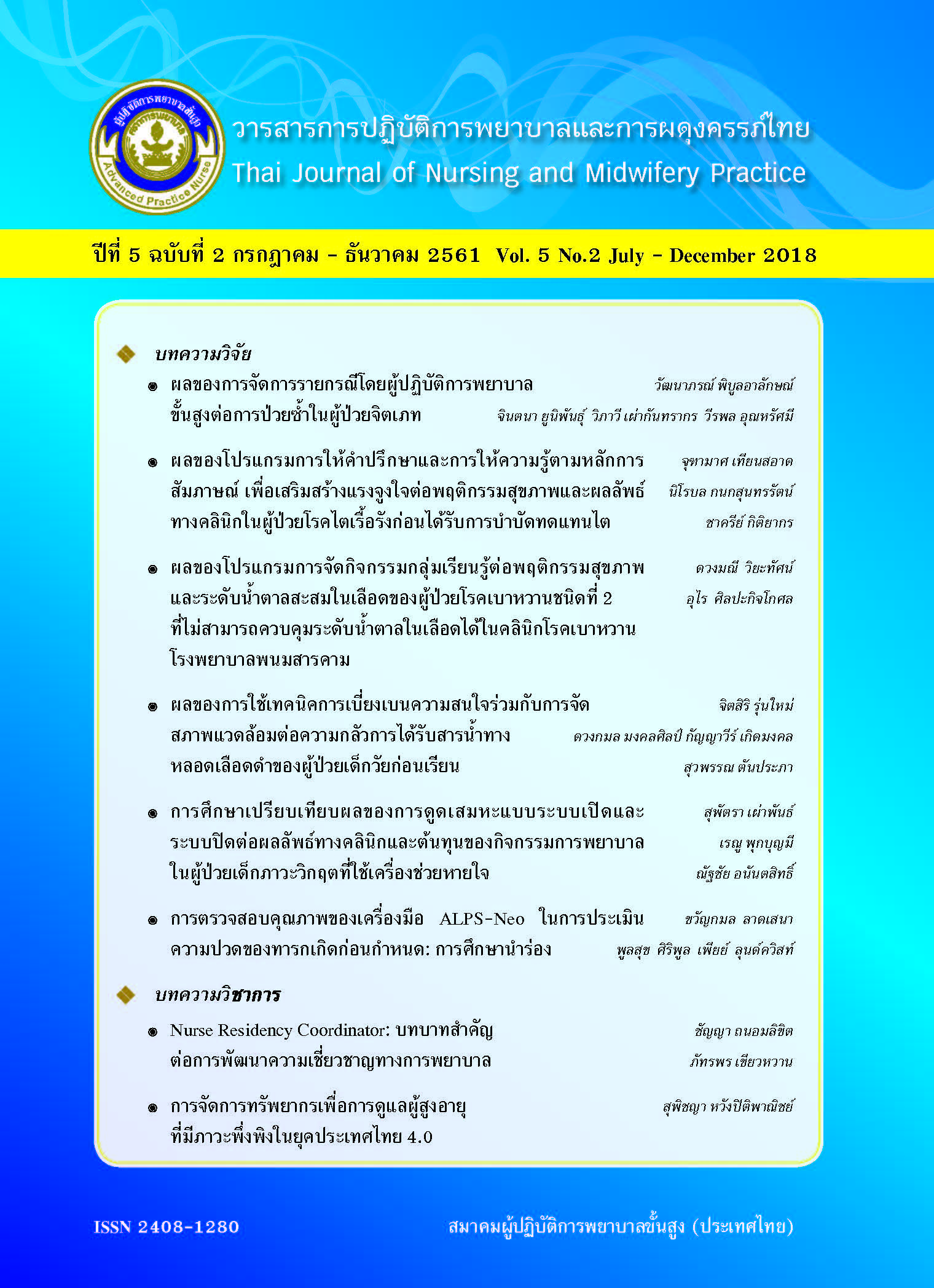Effectiveness of Group Learning Process Program on Health Behaviors and Glycosylated Hemoglobin of Uncontrolled Type 2 Diabetic Patients attended Diabetic Clinic at Phanomsarakham Hospital
Main Article Content
Abstract
This quasi-experimental research aimed at studying effects of group learning process program on health behaviors and glycosylated hemoglobin (HbA1c) levels of uncontrolled Type 2 diabetes patients promptly after and 12 weeks after using the program. Sample of 30 uncontrolled type 2 diabetes patients attended at diabetic clinic of Phanomsarakham hospital were purposively selected to participate in the developed program for 6 weeks. Instruments were group learning process program, health behaviors questionnaire and HbA1C levels at pre-and post-test after the program. Data were analyzed using descriptive statistics and Paired t-test. Results showed that after of the group learning process program, sample had statistically significant higher mean scores of health behaviors for diet management, exercise, and stress management than the pre-test mean scores at p<0.05. The hemoglobinA1c levels at the 12 weeks after the program, were statistically significant lower than the pre-test scores at p<0.05. It is suggested that the group learning process program should be used in order to improve health behaviors and blood glucose control of uncontrolled type 2 diabetes patients.
Downloads
Article Details
References
2. King H, Aubert R, Herman W. Global burden of diabetes, Prevalence, numerical estimates, and projections. Diabetes Care 1998; 21(9): 141-143.
3. Munkhong K, Kimsungnoen N, Namvongprom A. Comparison of Health Promoting Behaviors of Controlled and Uncontrolled Type 2 Diabetic Patients. Journal of the Royal Thai Army Nurses 2016; 17(3):17-20 (In Thai).
4. Aeklakorn W (Ed). Department of Medicine, Ministry of Public Health, Diabetes Association of Thailand survey. Nonthaburi: Graphic and Design; 2014. (In Thai).
5. Resnicow K, McMaster F, Bocian A, Harris D, Zhou Y, Snetselaar L, et al. Motivational interviewing and dietary counseling for obesity in primary care: an RCT. Pediatrics 2015; 135(4): 649-57.
6. Sulukanauruk C, Jaisanook W, Muktabhant B. Assocation of depression and stress with HbA1c level of type 2 diabetic patients attending the Diabetes Clinic of Nampong Hospital,Khon Kaen type 2 diabetic patients attending the Diabetes Clinic of Nampong Hospital, Khon Kaen Province. Srinagarind Medical Journal 2016; 31(1):35-45. (In Thai).
7. Spahn JM, Reeves RS, Keim KS, Laquatra I, Kellogg M, Jortberg B, et al. State of the evidences regarding behavior change theories and strategies in nutrition counseling to facilitate health and food behavior change. J Am Diet Association 2010; 110(6): 879-91.
8. Wattradul D, Pamornpol S, Pamorn S, Aoonjit S, Kaewwongdee S, Nuntajinda R. Effects of health promotion program on diabetes diet exercise knowledge and behavioral change in persons with type 2 diabetes. The Journal of Cardio-Thoracic Nursing 2010; 21: 31-44. (In Thai).
9. Archasantisuk P, Oba N, Vichitkaew N, Effects of Supportive and Educative Nursing Care on Self- care Behaviors and Level of Hemoglobin A1C in Diabetes Mellitus Patients. Journal of Nursing Science Naresuan University 2008; 2:66-77. (In Thai).
10. Tuntipitungsakul P. Diabetes Modification health behaviors Manual. Bangkok; 2557. (In Thai)
11. Piaseu N. Statistical Analysis and Common Problems. Thai Journal of Nursing and Midwifery Practice 2016; 3(2):83-89.
12. Cohen J. Statistical power analysis for the behavioral sciences. 2nd ed. New Jersey: Lawrence Erlbaum, Publishers; 1988.
13. Hitmatongcume H. Diabetes Mellitus knowledge. Public Health; 2547. (In Thai).
14. Spahn JM, Reeves RS, Keim KS, Laquatra I, Kellogg M, Jortberg B, et al. State of the evidences regarding behavior change theories and strategies in nutrition counseling to facilitate health and food behavior change. J Am Diet Association 2010; 110(6): 879-91.
15. Wongsunopparat B, Ngarmukos C, Saibuathong N. Glycemic control in persons with diabetes after attending a group educational program for diabetes self-management. Rama Nursing Journal 2008;14: 289-97. (In Thai).
16. Koatdok S. Factors associated with self-care behaviors of diabetic patients who treat at outpatient department in Bhumibol Adulyadej Hospital. [Master Thesis]. Bangkok: Kasetsart University; 2012. (In Thai).
17, Pethchit R. Self-care behaviors and blood sugar control among patients with Diabetes Mellitus18,Hunnaphiruk L, Ronrittichai J, Tongcharoen V, Leelahakul V, Khumtaweeporn P. Pathophysiology nursing. 8th ed. Bangkok: Bunsiri printing; 2009. (In Thai).
18. Kumloypha K. Health Behaviors of Diabetic Patients in the Diabetes Mellitus Clinic of Kangsanamnang Hospital, Nakhonratchasima Province. The Journal of Boromarajonani College of Nursing 2011;17: 17-30. (In Thai).


